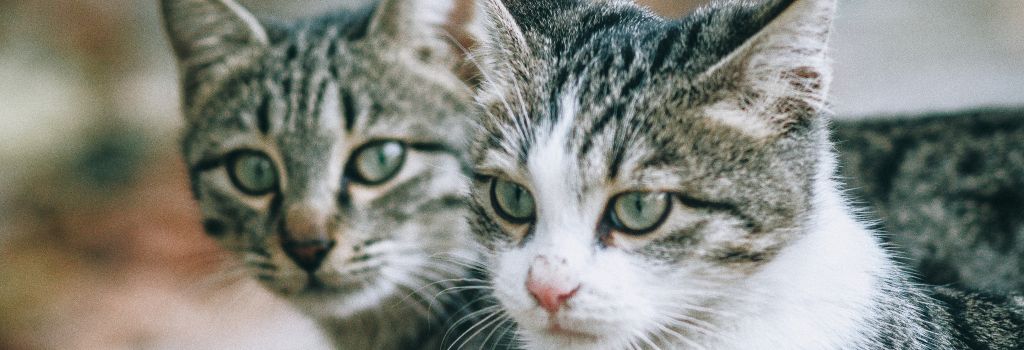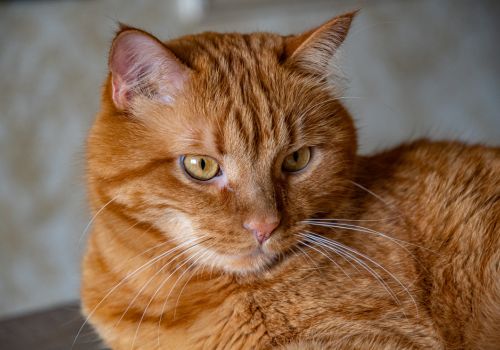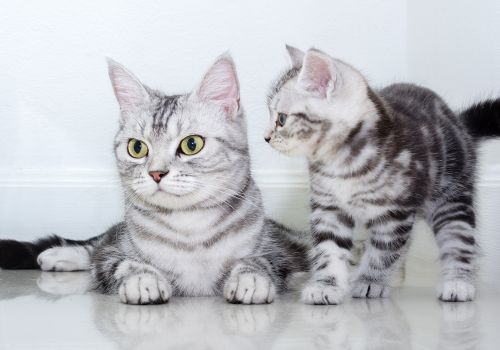So, you've brought home an American Shorthair, or maybe you're just smitten with the idea of having one? Well, you're in for a treat! These felines are like the four-legged therapists you never knew you needed.
Why We Love 'Em
First off, let's talk about why you fell head over heels for your fur baby. American Shorthairs have that soothing, soft meow that melts your heart. They make phenomenal companions, always there when you need a cuddle but independent enough to give you space.
What makes them so darn special? Their versatility! These felines are so even-tempered that they adapt effortlessly to various environments, making them the perfect family pet. Whether you live in a city apartment or sprawling country house, your American Shorthair will feel right at home.
The Quirks We Secretly Adore
- The Weight Watcher: You've got to keep an eye on those treat portions, or your American Shorthair may start looking like a round furball rather than a cat.
- The Mighty Hunter: These cats have a hunting instinct that is off the charts. Don't be surprised to find them stalking a fly or pouncing on a moving toy.
- The "Not Today" Streak: While loving, American Shorthairs sometimes aren't too keen on being picked up and carried around. But hey, who can blame them? They're independent spirits!
Despite these minor quirks, the love and personality they bring to your life make everything worth it.
A Little History Lesson
Did you know your American Shorthair is like a tiny piece of American history? These cats trace their roots back to the early settlers who came to North America. Originally known as the Domestic Shorthair, these kitties were the OG pest controllers on ships, keeping the rat population in check.
In the fancy world of cat shows, the American Shorthair is basically royalty. They were one of the first breeds to strut their stuff on the catwalk, gaining recognition from the Cat Fanciers Association as far back as 1906!

Keeping Your Furry Friend Healthy
Last but not least, we know how much you care about your American Shorthair's well-being. That's why it's crucial to be aware of some common health concerns that could affect them. By being in the know, you can work on a personalized health plan to keep your kitty healthy and happy for years to come.
So there you have it, the American Shorthair in all its glory! Whether you're a seasoned American Shorthair owner or contemplating getting one, these cats truly make a home complete.
Genetic Predispositions for American Shorthairs
The Heart of the Matter: Cardiomyopathy
Cardiomyopathy is a fancy term for heart muscle disease. It could be inherited or a result of other illnesses that mess with the heart. The symptoms might be hard to spot because cats are pros at hiding when they're not feeling well. If your kitty suddenly shows rapid breathing, a lack of energy, or a poor appetite, it's time for an emergency vet visit. Regular check-ups can help spot early signs of heart disease, making treatment more effective.
Arterial Thromboembolism: Say What?
This is as serious as it sounds. It's basically a fancy way to say blood clots can happen in cats with heart disease. If you see your kitty dragging its hind legs, acting like they're in pain, and crying, don't wait—rush to the vet. With prompt action, most cats recover fully.
Pee-ky Behavior: FLUTD
Is your cat suddenly avoiding the litter box and opting for, say, your favorite clean pile of clothes? Hold on before getting mad; it might be signaling an issue. This could be a sign of Feline Lower Urinary Tract Diseases (FLUTD). Symptoms include blood in the urine, straining, or crying while urinating. If you notice these, call the vet right away, especially if you have a male cat, as this can become an emergency really fast.
Renal Failure: Know the Signs
Kidney issues are sadly common in older cats and can sometimes be seen in youngsters if they've inherited kidney defects. Symptoms could include weight loss, poor appetite, and vomiting. While it's a progressive disease, special diets and medications can make a big difference.
Hyperthyroidism: A Go-Go Gadget Gland
Some middle-aged cats develop a benign tumor in their thyroid gland that makes them produce too much T4 hormone. This results in the cat seeming super active but actually masks underlying illness. If you notice vomiting, weight loss, or increased thirst, it's time for a vet visit. A blood test can easily diagnose this, and effective treatments are available.
Diabetes Mellitus: Not Just a Human Issue
With the indoor sedentary lifestyle most cats lead these days, diabetes is on the rise. If you notice weight loss, excessive thirst, and frequent urination, get your kitty tested. The good news? Weight loss and a proper diet can manage this disease well.

Allergies: It's Not Just Sneezing
Humans sneeze, but cats get itchy skin when they're allergic to things like pollen, mold, or dust. Common signs of allergies include over-grooming, red sores, and frequent ear infections. Your vet will help identify the cause and provide treatment options.
Polycystic Kidney Disease or PKD
It's that pesky genetic illness that first gained notoriety in Persian cats but doesn't mind making an appearance in American Shorthairs, too, Pyruvate Kinase Deficiency. Imagine tiny cysts sprouting inside your kitty's kidneys, and sometimes even the liver. Over time, these cysts grow and eventually compromise organ function. Yikes! Symptoms like weight loss, excessive thirst, and an overall sense of malaise often surface around the age of seven. Unfortunately, there's no magical cure for PKD, but early diagnosis can be a game-changer. Annual blood or urine tests can help in catching any dysfunction early on, and medications or special diets may help manage the condition. Breeders strongly advise against breeding cats with PKD genes, so a genetic test can be a wise move if you’re considering a little feline family expansion.
All Ears, or Maybe Not: The Issue of Deafness
Did you ever feel like your cat is ignoring you? Well, if you've got a white cat with blue eyes, it might not be an attitude problem. Cats with these features are more likely to be deaf. Some American Shorthair lines also have a tendency toward genetic deafness. While treatable issues like ear infections can also cause hearing problems, if your vet gives the all-clear, a more detailed hearing analysis might be needed. Living with a deaf cat can be just as rewarding, but it does mean that indoor living is a safer option. The outside world is not as forgiving to kitties that can't hear dangers approaching.

The A, B, and AB of Feline Blood Types
Emergencies are scary; more so when you're unprepared. Blood transfusions can be life-saving but did you know that your American Shorthair could have a different blood type than most domestic cats? Most kitties have type A blood, but American Shorthairs often have type B or, rarely, AB. Blood typing isn't just for TV crime dramas—it's vital for the safety of your pet during emergency procedures. As a responsible owner, consider having this test done and recorded in your cat’s microchip information. It could be a literal lifesaver.
The Tragic Tale of Neonatal Isoerythrolysis
If you're thinking of introducing some adorable kittens to the world via your American Shorthair, you should be aware of Neonatal Isoerythrolysis (NI). In this heart-wrenching condition, a newborn kitten ingests antibodies from its mother's colostrum that attack its own red blood cells, usually leading to a tragic outcome. The likelihood of this occurring increases if your American Shorthair has type B blood. So, get educated about this disease before you dive into the complexities of cat breeding.
Don't have a vet in your area yet? We can help you find a local veterinarian.
If you have more questions, the GeniusVets Telehealth platform will give you unlimited access to text and/or video calls with board-certified veterinarians! To learn more, click here.


